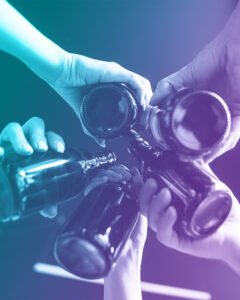How Many Drinks Is Too Much
It happened again, just like your spouse told you it would. You went to dinner last night and promised them you would only have one drink so you could drive home. The waiter drops off your vodka soda and your spouse’s glass of wine. They look at you hesitantly, but with a clink of your glasses, you both take a sip. Before you know it, your drink is gone before the appetizer even arrives. You flag the waiter for another one, assuring your spouse you can still drive home.

It happened again, just like your spouse told you it would. You went to dinner last night and promised them you would only have one drink so you could drive home. The waiter drops off your vodka soda and your spouse’s glass of wine. They look at you hesitantly, but with a clink of your glasses, you both take a sip. Before you know it, your drink is gone before the appetizer even arrives. You flag the waiter for another one, assuring your spouse you can still drive home.
As you pay and head to leave, your spouse takes the keys, and you can tell they are angry. You are wobbly as they lead you to the car, frustrated with how a simple night out turns into you getting wasted. Are five vodka sodas really that much? They remind you of the two neat bourbons you had with dessert as a “nightcap.” It becomes clear that you had more drinks than you wanted to again. How long will your spouse keep putting up with this? Why can’t you have one and be done?
In Pinellas County, 24.2% of adults engaged in binge or heavy drinking in 2019, higher than the state percentage of 16.3%. Clean Recovery Centers understands how readily available alcohol is, and that it can be easy to drink more than intended. Our alcohol use disorder treatment program addresses mental health and can diagnose and primarily treat mental health conditions at any phase of our program. Today, we are discussing how many drinks are too much, and when to seek treatment.
How Do I Determine Whether I’m Drinking Too Much Alcohol?
Determining if you are drinking too much or not seems like it would be a personal preference. To some degree it is, but there are standards for what a drink is and what constitutes drinking in moderation, heavy drinking, and binge drinking.
What Is a Standard Drink?
The National Institute on Alcohol Abuse and Alcoholism (NIAAA) defines a standard drink as 14 grams of pure alcohol. This equates to:
- 1.5 ounces of distilled spirits such as vodka, gin, and tequila
- 5 ounces of wine
- 12 ounces of regular beer
Certain alcoholic beverages will contain more or less alcohol depending on the ingredients used and the fermentation process. Different restaurants and bars may also have different ounce amounts they consider a “standard drink.” Ordering a glass of wine can be 6 or 9 ounces as opposed to the standard 5.
What Is Drinking in Moderation?
According to the Centers for Disease Control (CDC), drinking in moderation is 1 drink per day for females, 2 drinks per day for males, or not drinking at all. It is important to note that there is no true “healthy” way to drink. Alcohol is a known carcinogen, and drinking one drink every day can still cause harmful effects such as heart and liver conditions.
What Is Heavy Drinking?
 Heavy drinking is defined as 15 or more drinks per week for males and 8 or more drinks per week for females. Typically, drinking happens over the course of the week and not all in one day. Even two drinks per day for a female is considered heavy drinking. Those who drink heavily for long periods are more likely to experience physical effects from alcohol. Signs of liver damage may become present as well as heart conditions and memory problems.
Heavy drinking is defined as 15 or more drinks per week for males and 8 or more drinks per week for females. Typically, drinking happens over the course of the week and not all in one day. Even two drinks per day for a female is considered heavy drinking. Those who drink heavily for long periods are more likely to experience physical effects from alcohol. Signs of liver damage may become present as well as heart conditions and memory problems.
Binge drinking is not the same as heavy drinking. Binge drinking is defined as 5 or more drinks in one sitting for males and 4 or more drinks in one sitting for females. Sessions of binge drinking can be once a week, a month, or even a year. The danger of binge drinking is the possibility of alcohol poisoning, which occurs when the body is overwhelmed by the amount of alcohol in the system. If alcohol poisoning is ever suspected, medical attention should be sought immediately.
How Much Alcohol Is Too Much to Drink in a Week’s Time?
As we talked about above, heavy drinking is considered too much in a week’s time. Those who are living with high-functioning alcoholism are more likely to be drinking heavily throughout the week. Breaking down the numbers above to per day, males drinking more than 2 drinks per day and females drinking more than 1 drink per day are participating in heavy drinking and are likely to endure negative physical and mental effects.
When Does Excessive Drinking Become an Addiction?
Excessive drinking and addiction have some variability in each person. One of the key signs that alcohol consumption has turned into dependence is experiencing alcohol withdrawal. Withdrawal symptoms set in as little as 8 hours after the last drink. To get the symptoms to stop, drinking alcohol is needed. This is because the brain has adjusted to having alcohol in the system, and when it is taken away suddenly, the brain goes haywire. Chemical levels are out of balance which causes withdrawal symptoms. Some include:
- Irritability
- Agitation
- Anxiety
- Increased heart rate
- High blood pressure
- Shakiness
- Seizures
- Hallucinations
The Biology of Alcoholic Beverage Consumption
When alcohol is consumed, it enters the bloodstream through the lining of the stomach. From there, it causes effects to vital organs such as the brain, lungs, and kidneys before getting to the liver for processing. The liver works by using enzymes to turn alcohol into carbon dioxide and water to be expelled through urine and sweat. During this process, the toxic chemical acetaldehyde is produced. It is only in the body for a short time, but is the leading cause of liver cancer, disease, and cirrhosis.
The Dangers of Continued Heavy Drinking
Besides physical effects, continued heavy drinking can take its toll on mental health and relationships. Some signs alcohol dependency is affecting your life negatively include:
- Increased anxiety and depression
- Losing interest in hobbies, activities, and friendships
- Marital or relationship difficulties
- Financial burdens caused by drinking
- Poor job or school performance
- Periods of memory loss or fragmented memory
Detox and Rehab for Alcohol Use Disorder
Having a drink with friends or after a long day does not mean you have an alcohol use disorder. When drinking starts interfering with responsibilities and relationships, it may be time to start thinking about treatment options. Finding a detox and rehab for alcohol use disorder is not shameful, and you should never feel guilty for wanting to change the way alcohol has been affecting you. Surrounding yourself with like-minded peers can give you the insight you need to leave alcohol behind and start building a fulfilling future. Recovery from alcohol use disorder is always possible, you just have to take the first step.
If you or someone you love has been asking “How many drinks is too many,” it is time for a change from alcohol. Clean Recovery Centers is here with a compassionate and dedicated staff to provide a safe place to detox and recover from your heavy drinking. With a certified rapid-resolution therapist at each of our locations, we dive deep into the root causes of your addiction and help you develop coping skills to face adversities without alcohol. Together, we will help you get clean, live clean, and stay clean. Call us today at (888) 330-2532 to learn more about our program offerings and locations.
FAQs
What is excessive alcohol use?
Excessive alcohol use is defined as heavy drinking. This means 15 or more drinks per week for males and 8 or more drinks per week for females.
How much is normal to drink in a day?
The CDC defines moderate drinking as 1 or fewer drinks per day for females and 2 or fewer drinks per day for males.


